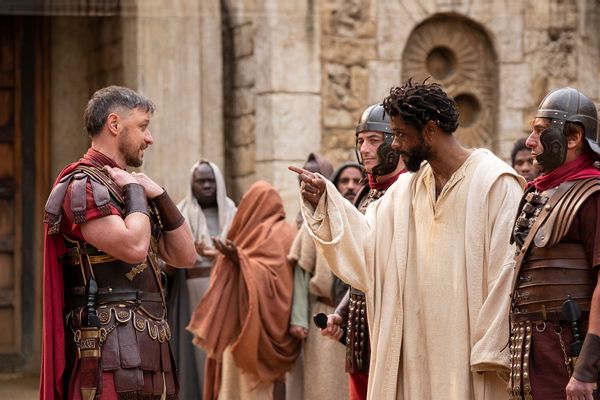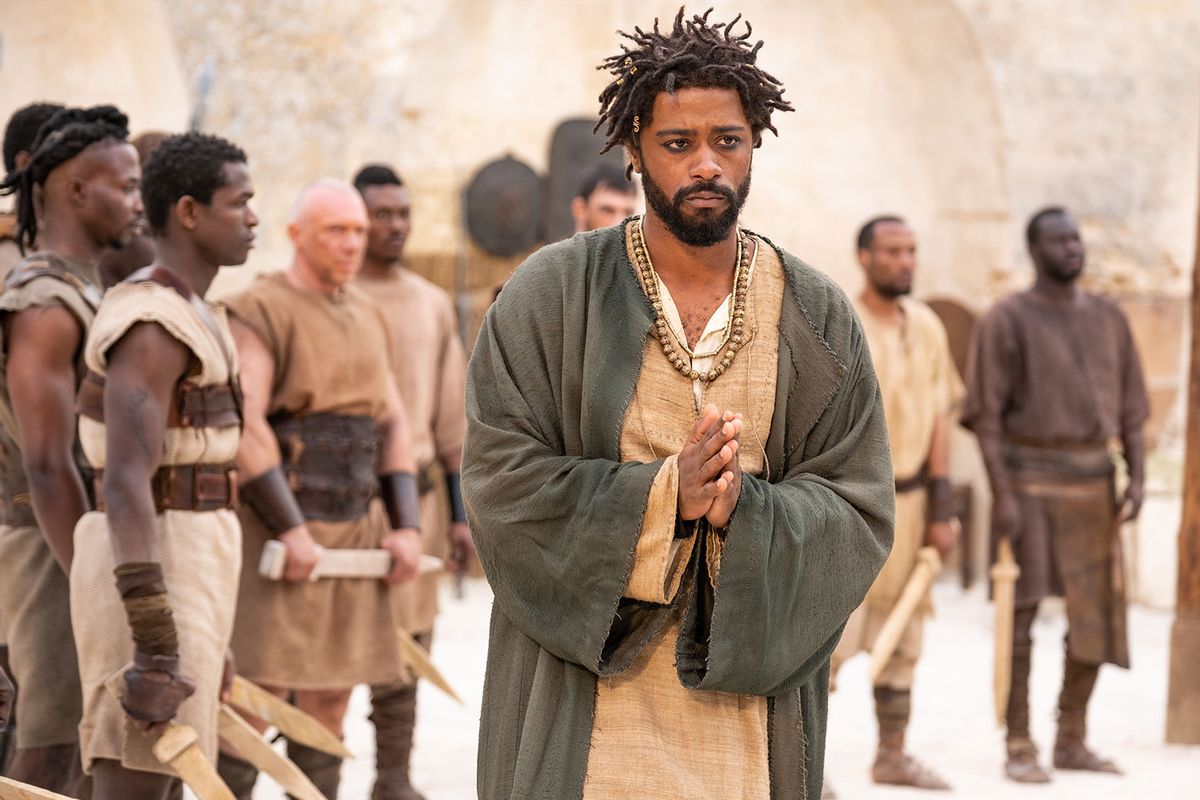Jeymes Samuel’s "The Book of Clarence" centers the strained relationship between twin brothers Clarence and Thomas (both played by LaKeith Stansfield). Clarence is a street pharmacist who, abandoned by his twin for the rumored Messiah, decides to pull a messianic hoax of his own. Each brother struggles under the weight of Roman occupation. Thomas retreats from the world, following a messiah at the expense of his relationship with his own mother and brother. Clarence courts trouble, borrowing money he can’t repay and selling products the Roman government can’t tax.
My brother’s lungs were formed in West Louisville.
In Samuel’s color-conscious casting of Black citizens of Jerusalem and the white Roman soldiers who police them, it’s hard to miss that the Roman soldiers grip their breastplates like contemporary police officers grip their vests. If that similarity wasn’t enough, Clarence’s mother hits the nail on the head when she screams, “They always take our babies!” as the Romans whip her son, marching him up the Hill of Golgotha to a premature death. I struggled through the brutal crucifixion scene, resentment for the Romans bubbling up each time Samuel brought another mourner into the camera’s frame — Clarence’s mother, his best friend, a neighborhood rival, the girl he loved. His twin brother Thomas. It was easy to transpose that resentment from these fictional, historical figures to the bad actors who stole my big brother’s last breath on a cross of labored breath built years before we were born.
By the time the credits rolled and my friend asked me what I thought of the movie, my resentment threatened to turn into an impotent hatred for men long gone. “I liked the movie. Mine is a critique of the gospel,” I said. “Give me a gospel where the Romans die!”
* * *
The Romans who crucified my brother are already dead and gone. They were not police officers or soldiers. They were Louisville’s city planners, working in tandem with Harland Bartholomew, a Massachusetts-born urban planner who redlined West Louisville in 1914, equating blight with Blackness and limiting its spread in the city. In so doing, he made my great-grandparents, implants from Athens, Alabama, sitting ducks for a chemical industry that chose to settle in Bartholomew’s “blight” areas, shaving years off the lives of residents. The West End of Louisville, where my kin spread out and settled, is still one of the most polluted areas in the city. According to The Courier Journal, “Neighborhoods near the [chemical] industries are twice as likely to have either asthma or high blood pressure, four times more likely to have COPD, seven times more likely to have heart disease; and four times more likely to have poor physical health.”
My brother’s lungs were formed in West Louisville, where he toddled on plump baby legs toward all the people who loved him. Our family later moved to Shively, an adjacent, only slightly less polluted suburb. He left for college and cleaner air in Lexington, Ky., and he lived there well after he was diagnosed with heart failure in 2004. My brother didn’t move back to Louisville’s West End until 2012. His health began a rapid decline. I’d like to think his trusted team of Lexington heart specialists would have cautioned him against moving to one of the most toxic neighborhoods in Kentucky had they known the history of redlining in our city. His early death was civically engineered.
 Pontius Pilate (James McAvoy) and Clarence (LaKeith Stanfield) in "The Book of Clarence" (Legendary Entertainment)
Pontius Pilate (James McAvoy) and Clarence (LaKeith Stanfield) in "The Book of Clarence" (Legendary Entertainment)
"The Book of Clarence" depicts the ordinary nature of civically engineered death. When Clarence hangs on the cross, we see hundreds of crosses sprawled out over the hill behind him. Jesus’ crucifixion (not shown on screen) is just the most widely published. This brutal, personal enforcement of social dominance is where the Roman occupation analogy may stretch too thin. Over-policing and capital punishment are two forms of military occupation that Western culture recycles but what of chemical warfare disguised as industrial revolution? Who is the Roman conqueror when air is the cross?
The question sent me scrambling for Howard Thurman’s "Jesus and the Disinherited," the book Dr. Martin Luther King, Jr. reportedly carried at all times. Thurman, born in 1899, was a theologian, preacher and mystic who positioned Jesus as a Palestinian Jew practicing his faith under Roman occupation. By drawing parallels between Jesus and the “disinherited” — America’s descendants of enslaved Africans struggling to survive Jim Crow — "Jesus and the Disinherited" grandfathered the images of Samuel’s film.
Chemical warfare is just one tactic used against bodies like mine in this country.
Thurman was the grandson of an enslaved woman who could not read the Bible for herself. He read the scriptures to her, skipping over Paul’s letters because of the way her captor had used them against her. "Jesus and the Disinherited" is an homage to the God concept she crafted while living under siege. What would Thurman say about the short distance between his grandmother’s and my brother’s vulnerability to racially constructed environments?
I know this: Thurman would caution against my demand for a gospel based on some “fundamental sense of justice” that leaves dead Romans in its wake. He would recognize hatred in this wish. “Hatred, in the mind and spirit of the disinherited,” Thurman writes, “is born out of great bitterness that is made possible by sustained resentment which is bottled up until it distills an essence of vitality, giving to the individual in whom this is happening a radical and fundamental basis for self-realization." For Thurman, hatred is the real threat of occupation because it disguises itself as common sense and self-protection, then spreads through the disinherited as the cancer it becomes. Chemical warfare is just one tactic used against bodies like mine in this country. Thurman prioritizes a more fragile site of subjection: the soul.
In some realm I sense but do not see, Thurman intercepts my daydreams about time traveling to Harland Bartholomew’s childhood home and smothering him in his crib. Had I managed such a trip to the year 1889, another post-Reconstruction born white baby would have risen to engineer the same outcome. Knowing Bartholomew’s name and reputation is just a convenient way to focus the angriest edge of my grief; a planned environment is too elusive an enemy for an imagination that wants revenge. Thurman cautions against such uses of imagination. “Hatred,” Thurman reminds me, “tends to dry up the springs of creative thought in the life of the hater, so that his resourcefulness becomes completely focused on the negative aspects of his environment.”
What if this environment is what killed the hater’s brother? I ask Thurman in this sensed, invisible realm.
The environment may have killed him, but how did he live before he died? Thurman responds, pulling my imagination away from Bartholomew’s house and toward all the space my brother occupied on this side.
* * *
My paternal grandmother nicknames my brother “Jive Turkey” in the late '70s for the way he is a smooth talker, angling to get what he wants and making you laugh along the way. By the time I’m born, the nickname has been shortened to “Turk.”
I am four and plucking a $10 bill from the birthday card I have just opened when Turk winks at me, counts out five $1 bills. He says, “How about I trade you five for one?” The adults crack up and stop him before I jump at the deal; he will play this game with my little brothers and me until we are old enough to know the difference and cut him off at “How about . . .”
He threw the first of many extravagant backyard birthday parties just weeks after his diagnosis, naming the series a “Celebration of Life.” For 12 years, he playfully cajoled invitees into road trips by reminding us that, in his condition, nobody knew which party would be his last.
My big brother joined Omega Psi Phi Fraternity, Incorporated in the Spring of ’92 and made himself a legend. “I think I was so young that I just became the frat, and it became me,” he once told me when I was wondering why he loved the crowds that made me skittish at his celebrations of life.
For six months, the Jewish Hospital lobby looks like a celebration of life. It is full of his fraternity members, cycling in and out of the ICU two brothers at a time. In the hospital room and the waiting room, they laugh as if death doesn’t isn’t lurking, giving all their jokes the weight of last words.
I remember the words my brother spoke on a rare visit when we were the only two people in the room and we still thought we’d get to go home. “Tell me something fun. I’m so bored in here,” he said, flexing his fingers and flipping channels on the wall-mounted tv.
“I wish I had something to say,” I admitted. “I don’t do anything but work.”
“Is that what you want?” he asked, leaving the question between us to follow me over the years, find me on this page, and make me repeat it for myself. How have I held space in the shadow of my brother’s death? How do I want to hold space in light of my brother’s life?
I’ve been trying to adequately convey this light for six years now, but I keep tripping into the shadows of gone too soon. I collected those efforts into a manuscript I tried, and failed, to get published. I know two reasons why "A Gospel of Gone Men" didn’t sell: 1) A gospel is good news, and there’s no good in gone; and 2) The title was disingenuous, as the men I wrote about kept finding ways to show me their still-here-ness.
I feel my brother nudging me now — away from those pages, toward a new story about a life too expansive to end at the body’s last breath. I feel him reminding me that I have just turned a comedy into a meditation on untimely death, and that such rumination misses the magic of Samuel’s comedic gospel. At the end of the day, laughter is the space we hold for and with ourselves. It’s the space no Roman can police. It’s the space no engineer can contain.
Read more
about this topic

Shares